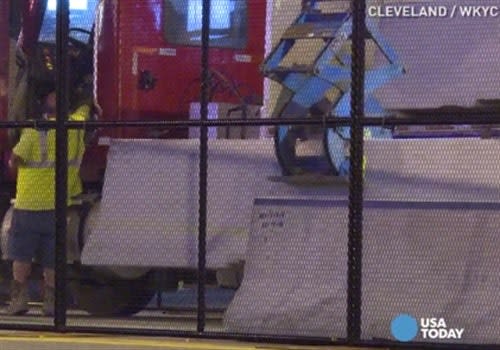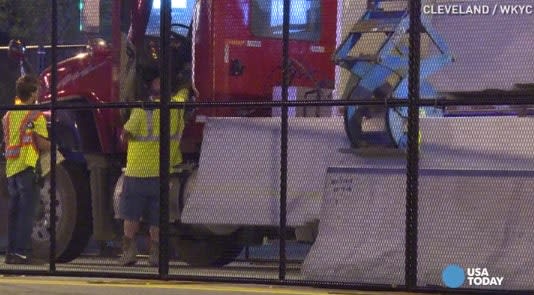
VIDEO: Nice Attack Comes Amid Heightened U.S. Security Going Into Conventions
The truck attack that killed more than 80 people in Nice, France serves as an ominous reminder of the damage a lone terrorist can accomplish as the U.S. prepares for political conventions.

The truck attack that killed more than 80 people in Nice, France serves as an ominous reminder of the damage a lone terrorist can accomplish as the U.S. prepares for political conventions, reports USA Today.
Plowing a large vehicle through a crowd, as happened at the Bastille Day celebration in Nice, demonstrates the high level of damage that can be inflicted in open spaces that are difficult to defend against agile, one-person attacks.
The Nice mayor's office confirmed Friday that Mohamed Bouhlel, 31, a resident of the French seaside city, is the main suspect in the attack. Bouhlel, who was killed in a shootout with police, does not appear to have been known to intelligence services and was not on a terrorism watch list.
The Nice attack came as American federal authorities and big-city police departments heightened security after shooting attacks in Dallas, Orlando, and San Bernardino, and in the wake of Islamic State-linked bombings at airports in Istanbul and Brussels.
More than 3,000 federal security officials are heading to the Republican National Convention that starts Monday in Cleveland and the Democratic National Convention the following week in Philadelphia.
Thousands of state and local officers will also patrol the conventions. Extra steps for the convention include Cleveland police staffing two officers in each patrol car rather than one. Visible security measures in place for months at public events include searches of bags, more teams of bomb-sniffing dogs circulating and more screening equipment, according to the Department of Homeland Security.
But while federal and local authorities are monitoring security conditions, they say there are no specific threats against the conventions or big cities.
Brian Michael Jenkins, director of the Mineta Transportation Institute's National Transportation Safety and Security Center, said the policy debate is over how strictly to block or screen vehicles, while still allowing commerce and traffic to flow.
"The problem with a vehicle as weapon is that it's so accessible – you don't have to acquire an arsenal or build a bomb," Jenkins said. "It is a vulnerability of modern society."

What if Level I retention didn’t require a full duty rig? Safariland’s Solis delivers trusted ALS security in a streamlined OWB platform built for administrative and plainclothes professionals who need protection without the bulk.
Read More →
Real-world scenarios show that a tracking canine can detect and follow a human track several hours after it was made.
Read More →
In this video, we get a look at the latest law enforcement boots from Garmont Tactical, both for men and women. Kyle Ferdyn, sales manager, showcases four of the latest boots.
Read More →
With the commercial availability of Avon Protection’s EXOSKIN-S2, users now have increased options for their protective suit requirements across the spectrum of CBRN threat environments.
Read More →
Versaterm has acquired Aloft, an FAA-approved Unmanned Service Supplier (USS) that specializes in real-time airspace intelligence and flight authorizations.
Read More →
The two-day DroneSense Innovation Summit by Versaterm will bring together public safety and industry experts to define best practices for scaling drone operations.
Read More →
Learn what makes a boot good for police officers as POLICE visits with Kyle Ferdyn, of Garmont Tactical, who explains the features of boots and why each is needed in an LE boot.
Read More →
The application period for the Folds of Honor scholarship program is now open through the end of March. Scholarships support students from early education through postsecondary studies, easing the financial burden for families who have given so much in service to others.
Read More →
With GovX verification now integrated directly into the Team Wendy checkout experience, eligible customers can confirm their status in just a few clicks and have the discount applied automatically.
Read More →
5.11 showcased new apparel and footwear products during SHOT Show 2026, including new color options for the A/T Boa Lite Mid Boot and the Founder’s Jacket.
Read More →